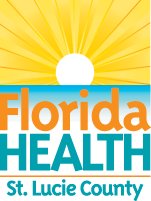It's a New Day in Public Health.
The Florida Department of Health works to protect, promote, and improve the health of all people in Florida through integrated state, county, and community efforts.
The Florida Department of Health in St. Lucie County Educates and Encourages Floridians to test your way and Celebrate National Black HIV/AIDS Awareness
February 10, 2020
In 2006 St. Lucie was highlighted in the Silence Is Death Report where severe racial and ethnic HIV/AIDS, disparities reached epidemic proportions. St. Lucie was number one in the State of Florida with one in 35 blacks, diagnosed compared to one in 710 whites. St. Lucie understands this year’s theme, We’re in This Together, we had the commitment of community and strong leaders, results - we had the largest decrease in new HIV infections in the State. “Now, more than 10 years later we are ranked number 19 out of 67 counties, a huge accomplishment, yet there is still much work to be done” said Clint Sperber, Administrator and County Health Officer for the Florida Department of Health in St. Lucie County.
The Centers for Disease Control and Prevention (CDC) recommends that all individuals 13–64 years of age get tested for HIV at least once during their lifetime, and persons at increased risk for HIV infection get tested at least annually. In the United States, Blacks account for 13% of the population, but disproportionately represent 43% of new HIV diagnoses. In recent years, there have been a steady disparity decrease, but inequities remain. From 2010 to 2017, HIV diagnoses:
- decreased 15% among blacks overall;
- decreased 27% among black women;
- decreased 32% among heterosexual black men;
- were stable among gay and bisexual black men overall, but varied by age.
Limited access to services, stigma, discrimination, poverty, and homophobia place some African Americans at higher risk for HIV. The poverty rate is higher among African Americans than other racial/ethnic groups, and the socioeconomic issues associated with poverty—including limited access to high-quality health care, housing, and HIV prevention education—directly and indirectly increase risk for HIV infection.
If you are at-risk or increased risk of becoming infected with HIV, there is a pill called (PrEP) Pre-exposure Prophylaxis that reduces the risk of HIV infection by up to 96%. New tools, like PrEP, a daily pill to prevent infection, can help us end new infections; when taken consistently. PrEP should be used in conjunction with other prevention methods like condoms to reduce the chance of infection. According to CDC, taking PrEP daily reduces the chance of getting HIV by more than 90 percent. As part of our strategic efforts to eliminate HIV in Florida, the Department has made Pre-Exposure Prophylaxis (PrEP) medication available at no cost at all 67 CHDs. With early diagnosis, individuals can begin appropriate treatment and care resulting in better health outcomes.
In Recognition of NBHAAD
The Florida Department of Health in St. Lucie and Midway Specialty Care Clinic Hosts:
“Black Health Panel” and Resource Event
Date: Friday, February 28, 2020
Time: 6:00 pm to 8:30 pm
Location: Florida Department of Health in St. Lucie County 714 Avenue C | Fort Pierce, FL 34950
For more information contact: Cassandra.Novalien@FLHealth.gov or (772) 462-3535
This event will provide a space for one-on-one, up close and personal interaction with health care providers. Questions asked and answered about black health disparities by black health professionals on various health topics that pertain to us, by us, and for us. Community organizations will be present to provide resources and educational materials. Confidential testing will also be available for HIV, Chlamydia, Gonorrhea, and Syphilis. This is a free event to the community.
Find a PrEP provider near you with the department’s PrEP Providers List. You can locate HIV counseling, testing and referral sites by visiting www.KnowYourHIVStatus.com or texting ‘FLHIV’ to 898211.
For more information, call the Florida HIV/AIDS Hotline at 1-800-FLA-AIDS or 1-800-352-2437; En Español, 1-800-545-SIDA; In Creole, 1-800-AIDS-101. To chat with a live counselor at the Florida HIV/AIDS Hotline, visit www.211bigbend.org/flhivaidshotline.




Connect with DOH